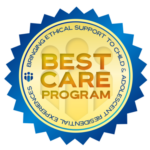Teens are in a constant state of change as a result of rising hormone levels and life stressors. As a result, it’s sometimes difficult to identify worrisome signs in your teenage son’s behavior. As your adolescent is going through this stage of life and developing their sense of self, there are some indications you can look for that may indicate a deeper issue. Recognizing signs of mental illness is an important step to ensuring your son has the support he needs during this time of change.
What Does Mental Illness Look Like?
Depending on the type of mental health disorder your teenage son is struggling with, the signs may vary. The main indicators to look for are significant changes in mood, behavior, or physical appearance. Differentiating these from normal teenage development is challenging, but it’s important to remember that it never hurts to get another opinion. Five of the most common signs your son may have a mental illness are:
- Change in Academic Performance
- Lack of Interest in Activities
- Physical Changes
- Extreme Mood Changes, Irritability
- Significant Relationship Changes
Again, these will look slightly different depending on the type of mental health issue your adolescent is struggling with, but these themes remain consistent.
*Note: This is not a replacement for medical advice. If you are noticing concerning behavior, your teen should be evaluated by a mental health or medical professional.
Change in Academic Performance
Some teenage boys are more academically inclined than others. You may even see differences between your own children. One will spend hours dedicated to homework while the other requires someone forcing them to sit down to do the bare minimum. When it comes to identifying a mental illness, consider the baseline of your son. If he used to be a student that made A’s and B’s but now struggles to pass his classes, this is an indication that there may be more going on. Likewise, an adolescent who consistently makes C’s may stop turning in any assignments or going to class. Anything that is a significant change for your son should be noted.
Lack of Interest in Activities
This is one of the greatest indicators of an underlying mental illness. Your teenager likely has things he enjoys in life. Whether it’s a sport, hanging out with friends, a hobby, or even video games, he will spend time on the things that make him happy. However, when an adolescent develops a mental health disorder, they lose interest in the things they used to love. Your son may come to you and say he wants to quit his extracurricular activities. He might suddenly stop spending time with friends and isolate himself at home. Losing interest in previously enjoyable activities is a clear sign that there is more going on with your son.
Physical Changes
There may not always be physical changes present with a mental illness, but any drastic change in appearance is a reason for concern. A sudden increase or decrease in weight may indicate disordered eating or drug use. Anxiety can result in tremors or restlessness. Depression, bipolar disorder, and drug or alcohol use may affect sleep patterns, resulting in fatigue or bursts of energy. Bloodshot eyes, unnatural pupil dilation, persistent bloody noses, and lack of hygiene also are indications of a mental health issue. Any physical changes should first be addressed with a medical provider to ensure there is not an underlying health condition. If no health issues are present, these could be the result of a mental illness.
Extreme Mood Changes and Irritability
Adolescents are known for moodiness and occasional irritability. However, the key difference between normal mood changes and concerning ones is when there seems to be no foundation for these emotions. For example, as a parent, you naturally want to know what is going on with your son. He may seem closed off and not offer much information, and this is normal as teens begin asserting their independence. In contrast, if you ask your son about his day in general, and he lashes out, this unwarranted defensiveness could indicate an underlying mental illness. He may be attempting to hide drug or alcohol use, or he could be lacking the emotional coping skills he needs to appropriately interact.
Significant Relationship Changes
Much like how interests change (or seem to disappear completely) when teens are struggling with mental health disorders, relationships often suffer the same fate. Take note of who your adolescent is spending time with and if that changes. They may begin to cut off long-term friendships and isolate themselves. You may also notice a complete shift in the type of person your son associates with. Teens will naturally choose relationships that support their behavior or attitude. For example, someone who is engaging in drug use will find like-minded individuals to use with. A persistent negative attitude or anger may drive friends away or create new, unhealthy relationships. These are all potential indicators of mental illnesses.
Addressing Concerning Behaviors
If you are concerned your teenage son is exhibiting signs of a mental illness, the first step is to have a conversation with him about your observations. Be aware that they may have an explanation for everything and tell you not to worry. Trust your gut on these issues. It will never harm your son to be evaluated by a professional. Some of these behaviors also point to substance use, so be specific in what you are noticing and why it is concerning. Early intervention for substance use disorders and mental illness is imperative in your teenager receiving the treatment they need.
Help for Teens With Substance Use Disorders and a Mental Illness
Treating a dual diagnosis of a substance use disorder and mental illness is an intensive process that requires specialized care. At ARCH Academy, we help adolescent males ages 14-17 overcome their addiction while addressing other mental health concerns. Our program gives your son the treatment he needs to begin recovery in a safe, supportive environment. Through individual and group therapy, medication management, and adventure-based programming, your son will participate in evidence-based practices to build a foundation for lasting success. We also support your son’s academic goals through our accredited, private school located in Nashville, Tennessee. If your teenage son would benefit from residential addiction treatment, contact our team today to learn more about our rehab center.




